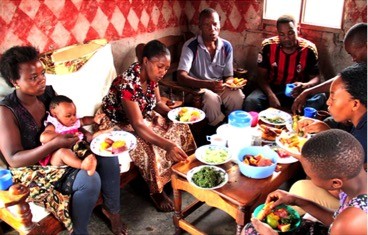
July 2015—In Tanzania, low-income families typically have limited access to healthy foods. This impacts their ability to make good nutritional choices and can result in malnutrition.
Ester Joram is a mother of one living in a household of five people in the village of Kahe in the Kilimanjaro region of Tanzania. For a long time, her family suffered from health problems related to a lack of vitamins and essential minerals such as vitamins A and K, calcium and potassium. At 20 pounds, her young daughter was underweight for her age, and there was little variety in the family’s diet.
To fight this endemic problem, the Tanzania Horticultural Association helps families grow and integrate a variety of fruits and vegetables into their diet. In October 2014, Joram met with an Association nutritionist, Lawrencia James, and learned nutritional benefits from consuming fruits and vegetables. She also learned how to establish a home garden.
In a bid to eliminate malnutrition, hunger and poverty in Tanzania, the Association—with support from USAID through the U.S. Government’s global hunger and food security initiative Feed the Future—has reached out to more than 1,000 families like Joram’s over the past five years to improve nutrition-related behaviors. These initiatives are focused on engaging more women as agents of change in communities and the entire country.
Today, as a result of the Association’s interventions, Joram’s family consumes vegetables twice daily, where previously they consumed vegetables only once a week. And their health has improved. Three months after the Association’s intervention, Joram's daughter weighed 26 pounds.
“Nurses told me that my daughter’s health condition is progressing well,” said Joram. “She is no longer anemic, and her body weight is now standard. I no longer buy vegetables. My home garden provides it! I know this achievement is attributed to consumption of vegetables and fruits.”
Joram is now earning an average weekly income of $5 (10,000 Tanzanian shillings) by selling the vegetables to her neighbors and plans to expand her home garden to further increase her income.
LINKS
Follow @AmEmbTZ, on Facebook, on Flickr
Follow@FeedtheFuture, on Facebook, on YouTube







Comment
Make a general inquiry or suggest an improvement.